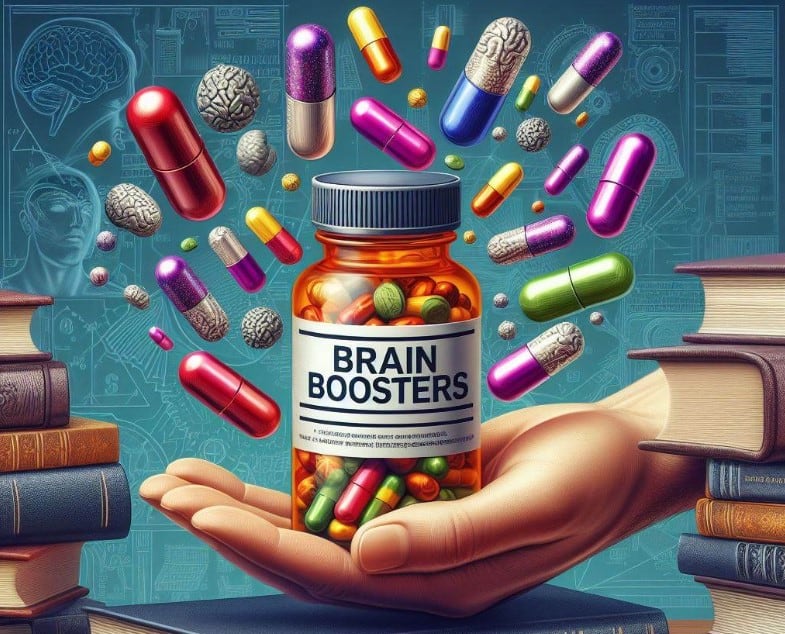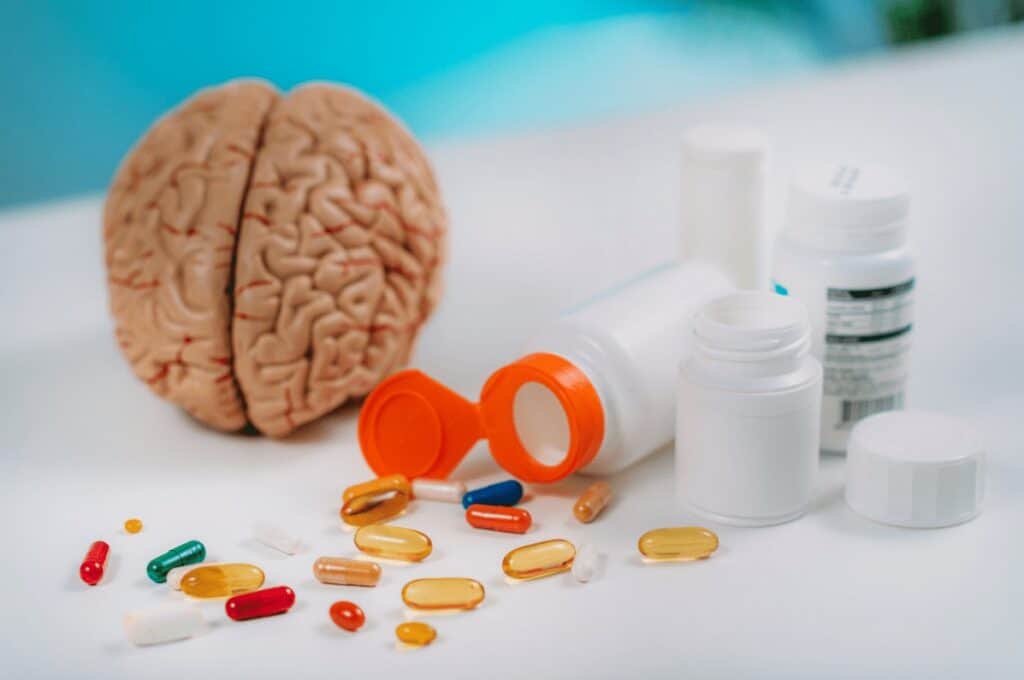Do you ever feel like your brain is not working at its full potential? Do you struggle with memory, focus, creativity, or mood? If so, you might benefit from nootropics, also known as smart drugs or cognitive enhancers.
Nootropics are substances that can improve various aspects of cognitive function, such as learning, memory, attention, motivation, mood, and creativity.
They can be natural or synthetic, and they can have different mechanisms of action and effects on the brain.
In this blog post, I will explain what nootropics are, how they work, what types of nootropics are available, how to choose and use them safely and effectively, and what benefits you can expect from them.
By the end of this post, you will have a better understanding of how to enhance your cognitive function with nootropics.
What are Nootropics and How Do They Work?

Nootropics are substances that can enhance cognitive function by modulating various neurotransmitters, hormones, enzymes, and other factors that are involved in brain function.
Neurotransmitters are chemical messengers that transmit signals between neurons, or brain cells.
Hormones are substances that regulate various bodily functions, such as metabolism, growth, and mood.
Enzymes are proteins that catalyze chemical reactions in the body. Other factors that affect brain function include blood flow, oxygen, glucose, inflammation, and antioxidants.
Nootropics can work by increasing or decreasing the levels or activity of these factors, depending on the desired effect.
For example, some nootropics can increase the levels of acetylcholine, a neurotransmitter that is involved in learning, memory, and attention.
Some nootropics can decrease the levels of cortisol, a hormone that is associated with stress and anxiety.
Some nootropics can enhance blood flow and oxygen delivery to the brain, which can improve energy and alertness.
Some nootropics can reduce inflammation and oxidative stress, which can protect the brain from damage and aging.
What Types of Nootropics are Available?

There are many types of nootropics, and they can be classified into different categories based on their origin, mechanism of action, and effect. Here are some of the most common categories of nootropics:
- Natural Nootropics: These are nootropics that are derived from natural sources, such as plants, herbs, fungi, or animal products. Some examples of natural nootropics are ginkgo biloba, bacopa monnieri, lion’s mane mushroom, omega-3 fatty acids, and caffeine.
- Synthetic Nootropics: These are nootropics that are created in a laboratory, either by modifying natural compounds or by designing new ones. Some examples of synthetic nootropics are piracetam, modafinil, noopept, and phenylpiracetam.
- Racetams: These are a class of synthetic nootropics that share a common chemical structure, called a pyrrolidone nucleus. They are known to enhance acetylcholine levels and activity in the brain, which can improve memory, learning, and focus. Some examples of racetams are piracetam, aniracetam, oxiracetam, and pramiracetam.
- Cholinergics: These are nootropics that affect the cholinergic system, which is responsible for acetylcholine production and signaling in the brain. They can either increase acetylcholine levels by providing its precursor, choline, or by inhibiting its breakdown, or they can enhance acetylcholine receptor activity. Some examples of cholinergics are alpha-GPC, citicoline, huperzine A, and galantamine.
- Stimulants: These are nootropics that increase the levels or activity of dopamine, norepinephrine, or serotonin, which are neurotransmitters that are involved in motivation, alertness, mood, and reward. They can also increase the levels or activity of adrenaline, which is a hormone that is involved in stress response and energy. Some examples of stimulants are caffeine, modafinil, methylphenidate, and amphetamine.
- Adaptogens: These are nootropics that help the body and the brain adapt to various types of stress, such as physical, mental, or emotional. They can modulate the levels or activity of cortisol, which is a hormone that is involved in stress response and regulation. They can also balance the levels or activity of other hormones, neurotransmitters, and enzymes that are affected by stress. Some examples of adaptogens are ashwagandha, rhodiola rosea, ginseng, and cordyceps.
- Antioxidants: These are nootropics that protect the brain from oxidative stress, which is a process that involves the production of free radicals, which are unstable molecules that can damage the cells and the DNA. Oxidative stress can be caused by various factors, such as aging, inflammation, pollution, or radiation. Antioxidants can neutralize free radicals and prevent or repair the damage they cause. Some examples of antioxidants are vitamin C, vitamin E, coenzyme Q10, and alpha-lipoic acid.
How to Choose and Use Nootropics Safely and Effectively?
Nootropics are not magic pills that can instantly make you smarter or happier. They are tools that can help you optimize your cognitive function, but they also require proper research, planning, and experimentation.
Here are some tips on how to choose and use nootropics safely and effectively:
- Do your research: Before you start using any nootropic, you should do your research and learn about its origin, mechanism of action, effect, dosage, side effects, interactions, and contraindications. You can use various sources of information, such as scientific studies, online forums, blogs, podcasts, or books. You should also consult your doctor or pharmacist if you have any medical condition or if you are taking any medication or supplement.
- Start low and slow: When you start using a new nootropic, you should start with the lowest effective dose and gradually increase it until you find your optimal dose. You should also monitor your response and adjust your dose accordingly. You should not exceed the recommended dose or use a nootropic for longer than advised. You should also take breaks from using nootropics to prevent tolerance or dependence.
- Stack smart: A stack is a combination of two or more nootropics that are used together to achieve a synergistic effect. Stacking can be a powerful way to enhance your cognitive function, but it can also increase the risk of side effects or interactions. Therefore, you should stack smart and only use nootropics that are compatible and complementary. You should also use the lowest effective dose of each nootropic and avoid using too many nootropics at once. You should also test each nootropic individually before adding it to your stack.
- Track your results: To measure the effectiveness of your nootropics, you should track your results and keep a journal of your experience. You should record various parameters, such as the name, dose, and time of your nootropics, your mood, energy, focus, memory, creativity, and productivity, and any side effects or changes you notice. You should also use objective tools, such as cognitive tests, brain games, or apps, to quantify your performance. You should also compare your results with your baseline and your goals, and make adjustments as needed.
What Benefits Can You Expect from Nootropics?
Nootropics can have various benefits for your cognitive function, depending on the type, dose, and duration of use.
Here are some of the most common benefits that you can expect from nootropics:
- Improved memory: Nootropics can enhance your memory by increasing the formation, consolidation, and retrieval of memories. They can also protect your memory from decay, interference, or loss. Nootropics can improve your short-term and long-term memory, as well as your working memory, which is the ability to hold and manipulate information in your mind.
- Enhanced focus: Nootropics can enhance your focus by increasing your attention span, concentration, and alertness. They can also reduce your distractibility, impulsivity, and procrastination. Nootropics can improve your focus on a single task, as well as your multitasking and switching abilities.
- Boosted creativity: Nootropics can boost your creativity by increasing your divergent thinking, which is the ability to generate novel and original ideas. They can also increase your convergent thinking, which is the ability to find the best solution to a problem. Nootropics can improve your creativity in various domains, such as art, music, writing, or innovation.
- Elevated mood: Nootropics can elevate your mood by increasing your levels or activity of serotonin, dopamine, or endorphins, which are neurotransmitters that are involved in happiness, pleasure, and reward. They can also reduce your levels or activity of cortisol, which is a hormone that is involved in stress, anxiety, and depression. Nootropics can improve your mood by making you feel more positive, optimistic, confident, and motivated.
- Increased energy: Nootropics can increase your energy by enhancing your metabolism, blood flow, oxygen, and glucose delivery to the brain. They can also reduce your fatigue, sleepiness, and lethargy. Nootropics can improve your energy by making you feel more awake, alert, and active.
Conclusion
Nootropics are substances that can improve various aspects of cognitive function, such as learning, memory, attention, motivation, mood, and creativity. They can be natural or synthetic, and they can have different mechanisms of action and effects on the brain.
In this blog post, I explained what nootropics are, how they work, what types of nootropics are available, how to choose and use them safely and effectively, and what benefits you can expect from them.
By the end of this post, you should have a better understanding of how to enhance your cognitive function with nootropics.
However, nootropics are not a substitute for a healthy lifestyle, diet, and exercise. They are also not a magic bullet that can solve all your cognitive problems. They are tools that can help you optimize your cognitive function, but they also require proper research, planning, and experimentation.
Therefore, before you start using any nootropic, you should do your homework and learn as much as you can about it.
You should also consult your doctor or pharmacist if you have any medical condition or if you are taking any medication or supplement. You should also start low and slow, stack smart, and track your results.
If you follow these tips, you can enjoy the benefits of nootropics without risking any adverse effects. You can also discover the best nootropics for your needs and goals, and create your own personalized nootropic regimen.
I hope you found this blog post informative and helpful. If you have any questions, comments, or feedback, please feel free to leave them below. I would love to hear from you and learn from your experience.
Thank you for reading and happy nootropic journey!

